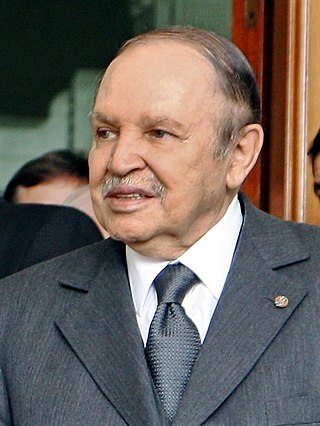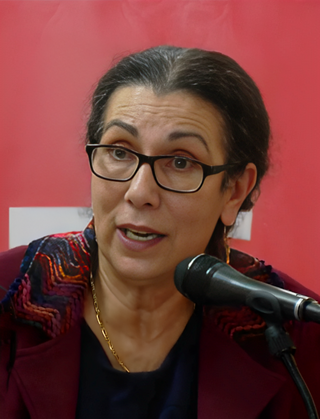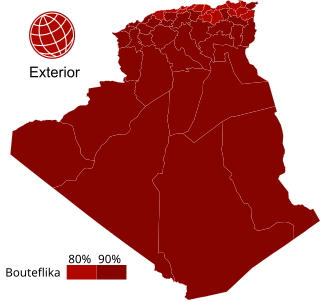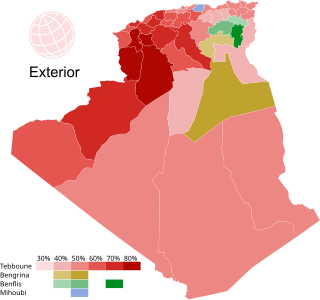| |||||||||||||||||
| Registered | 18,094,555 | ||||||||||||||||
|---|---|---|---|---|---|---|---|---|---|---|---|---|---|---|---|---|---|
| Turnout | 58.08% | ||||||||||||||||
| |||||||||||||||||
| |||||||||||||||||
 |
|---|
Contents |
Presidential elections were held in Algeria on 8 April 2004. [1] Incumbent President Abdelaziz Bouteflika was re-elected with 85% of the vote.
| |||||||||||||||||
| Registered | 18,094,555 | ||||||||||||||||
|---|---|---|---|---|---|---|---|---|---|---|---|---|---|---|---|---|---|
| Turnout | 58.08% | ||||||||||||||||
| |||||||||||||||||
| |||||||||||||||||
 |
|---|
Contents |
Presidential elections were held in Algeria on 8 April 2004. [1] Incumbent President Abdelaziz Bouteflika was re-elected with 85% of the vote.
There were about 130 official foreign observers in Algeria for these elections, which followed more than a decade of civil conflict. Delegations of observers came from the Arab League, the African Union, the United Nations, the European Parliament and the Organization for Security and Cooperation in Europe (OSCE).
An OSCE spokesman said its small election monitoring team observed no obvious electoral fraud, and that the election, while not perfect, was excellent by regional standards and that it is "pretty clear" the results reflected the views of the Algerian people.
However, the Kabyle population boycotted the elections following the Arouch directives, only 10% (officially) of them went to vote.
| Candidate | Party | Votes | % | |
|---|---|---|---|---|
| Abdelaziz Bouteflika | National Rally for Democracy | 8,651,723 | 84.99 | |
| Ali Benflis | National Liberation Front | 653,951 | 6.42 | |
| Abdallah Djaballah | Movement for National Reform | 511,526 | 5.02 | |
| Said Sadi | Rally for Culture and Democracy | 197,111 | 1.94 | |
| Louisa Hanoune | Workers' Party | 101,630 | 1.00 | |
| Ali Fawzi Rebaine | Ahd 54 | 63,761 | 0.63 | |
| Total | 10,179,702 | 100.00 | ||
| Valid votes | 10,179,702 | 96.87 | ||
| Invalid/blank votes | 329,075 | 3.13 | ||
| Total votes | 10,508,777 | 100.00 | ||
| Registered voters/turnout | 18,094,555 | 58.08 | ||
| Source: Algeria Official Journal | ||||
The History of Algeria from 1962 to 1999 includes the period starting with preparations for independence and the aftermath of the independence war with France in the 1960s to the Civil War and the 1999 presidential election.

The president of the People's Democratic Republic of Algeria is the head of state and chief executive of Algeria, as well as the commander-in-chief of the Algerian People's National Armed Forces.

Abdelaziz Bouteflika was an Algerian politician and diplomat who served as the seventh president of Algeria from 1999 to his resignation in 2019.

The Movement of Society for Peace, sometimes known by its shortened form Hamas, is a Sunni Islamist party in Algeria, led by Mahfoud Nahnah until his death in 2003. Its current leader is Abderrazak Makri. It is an offshoot of the Muslim Brotherhood.

The National Liberation Front commonly known by its French acronym FLN, is a nationalist political party in Algeria. It was the principal nationalist movement during the Algerian War and the sole legal and ruling political party of the Algerian state until other parties were legalised in 1989.

Ali Benflis is an Algerian politician who was Head of Government of Algeria from 2000 to 2004. In 2003, he became the general secretary of the National Liberation Front party. Benflis was a candidate in the 2004 presidential election, but the poll resulted in the re-election of Abdelaziz Bouteflika. Benflis ran yet again as an independent candidate in the 2014 Algerian presidential elections held on 17 April 2014. The result was that Abdelaziz Bouteflika was reelected as president with 81.53% of the votes, with Benflis ending as runner-up with 12.18%.

Chadli Bendjedid was an Algerian nationalist politician who served as the third President of Algeria. His presidential term of office ran from 9 February 1979 to 11 January 1992.

Louisa Hanoune is the head of Algeria's Workers' Party. In 2004, she became the first woman to run for President of Algeria. Hanoune was imprisoned by the government several times prior to the legalization of political parties in 1988. She was jailed soon after she joined the Trotskyist Social Workers Organisation, an illegal party, in 1981 and again after the 1988 October Riots, which brought about the end of the National Liberation Front's (FLN) single-party rule. During Algeria's civil war of the 1990s, Hanoune was one of the few opposition voices in parliament, and, despite her party's laicist values, a strong opponent of the government's "eradication" policy toward Islamists. In January 1995, she signed the Sant'Egidio Platform together with representatives of other opposition parties, notably the Islamic Salvation Front, the radical Islamist party whose dissolution by military decree brought about the start of the civil war.

Abdelaziz Belkhadem is an Algerian politician who was Prime Minister of Algeria from 2006 to 2008. He was also Secretary-General of the National Liberation Front (FLN). Belkhadem served as Minister of Foreign Affairs from 2000 to 2005 and Personal Representative of President Abdelaziz Bouteflika from 2005 to 2006; after serving as Prime Minister from 2006 to 2008, he was again appointed as Personal Representative of the Head of State in 2008.

Algeria elects on the national level a head of state – the president – and a legislature. The president is elected for a five-year term by the people. People's National Assembly has 407 members, elected for a five-year term in multi-seat constituencies by proportional representation. Eight seats in the national assembly are reserved for Algerians abroad. The Council of the Nation has 144 members, 96 members elected by communal councils and 48 members appointed by the president.

The Oujda group, also known as the Oujda clan, was a group of military officers and politicians in Algeria that operated during the Algerian War (1954–62). After the independence of Algeria, the Oujda group dominated Algerian politics after the Algerian summer crisis in 1962.

Parliamentary elections were held in Algeria on 30 May 2002 to elect members of the People's National Assembly. The governing National Liberation Front (FLN) won a majority of seats in the election. The election suffered from a low turnout, violence and boycotts by some opposition parties.

Presidential elections were held in Algeria on 9 April 2009. The result was a victory for incumbent President Abdelaziz Bouteflika, who was re-elected with 90% of the vote.

Presidential elections were held in Algeria on 15 April 1999. Abdelaziz Bouteflika was elected with 73.8% of the vote after the other six candidates withdrew on the eve of the elections.

Parliamentary elections were held in Algeria on 10 May 2012. The incumbent coalition, consisting of the National Liberation Front (FLN) of President Abdelaziz Bouteflika and the National Rally for Democracy (RND) of Prime Minister Ahmed Ouyahia, held on to power after winning a majority of seats. The Islamist parties of the Green Algeria Alliance lost seats.

Presidential elections were held in Algeria on 17 April 2014. Incumbent President Abdelaziz Bouteflika was re-elected with 82% of the vote. Issues in the campaign included a desire for domestic stability after the bloody civil war of the 1990s, the state of the economy, the frail health of the 15 year incumbent and 77-year-old president whose speech was "slurred and inaudible" in his only public outing during the campaign, and the less-than-wholehearted support given the president by the normally united and discrete ruling class.

Presidential elections were held in Algeria on 12 December 2019. The election had originally been scheduled for 18 April, but was postponed due to sustained weekly protests against plans by the incumbent president Abdelaziz Bouteflika to run for a fifth term. Bouteflika resigned on 2 April and Abdelkader Bensalah was elected acting president by parliament a week later. On 10 April the election was rescheduled for 4 July. On 2 June the Constitutional Council postponed the elections again, citing a lack of candidates. A new electoral authority, Autorité nationale indépendante des élections (ANIE), was created in mid-September as an alternative to the existing Haute instance indépendante de surveillance des élections (HIISE) defined by the 2016 constitution. The election was rescheduled for 12 December 2019 and ANIE, of disputed constitutional validity, announced five valid candidates on 2 November. In their 200000 strong protest on 1 November, Algerian protestors rejected the 12 December election and called for a radical change in the system to take place first. The Forces of the Democratic Alternative (FDA) alliance and the Justice and Development Front also called for boycotting the 12 December election, and the FDA called for creating a constituent assembly.

The 2019–2021 Algerian protests, also called Revolution of Smiles or Hirak, began on 16 February 2019, six days after Abdelaziz Bouteflika announced his candidacy for a fifth presidential term in a signed statement. These protests, without precedent since the Algerian Civil War, were peaceful and led the military to insist on Bouteflika's immediate resignation, which took place on 2 April 2019. By early May, a significant number of power-brokers close to the deposed administration, including the former president's younger brother Saïd, had been arrested.

The Future Front is an Algerian political party.

Snap parliamentary elections were held in Algeria on 12 June 2021 to elect all 407 members of the People's National Assembly. Initially expected to be held 2022, the elections were brought forward following a constitutional amendment approved in a referendum in November 2020.